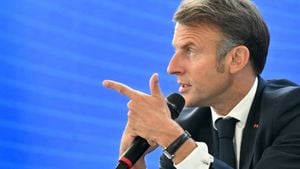The geopolitical situation in the Middle East and Europe has seen significant shifts as tensions continue to rise, particularly surrounding the actions of Russia, Iran, the U.S., and various groups within Syria. The fall of Bashar al-Assad's regime in Syria has frantic repercussions, sparking broader conflicts and strategic maneuvers from neighboring nations.
Just weeks ago, the Syrian civil war took a dramatic turn when Islamist rebels from Idlib province launched their offensive on November 27. Within 12 days, they were able to topple the Assad regime. This rapid advance shocked many, as it was initially perceived to be only a limited military operation to fend off increased attacks from Assad’s forces. The rebels, organized under Hay'at Tahrir al-Sham (HTS), outperformed expectations and quickly captured key territories, including the strategic city of Aleppo.
Reports indicate the rebels had prepared diligently, effectively unifying multiple militia groups under one command. The HTS utilized advanced tactics, capitalizing on their superior training and equipment, which included drone operations to assess enemy positions and execute strikes. Their swift capture of the M5 highway was pivotal, severing the main supply route between Aleppo and the capital, Damascus, which played directly to their strategic advantage.
While Syrian and Russian forces retaliated with air support, the momentum remained with the rebels. The surprise success encouraged various factions, and soon pro-Turkish groups joined the fray, compounding the challenges faced by Assad’s loyalists. The rebellion’s ability to garner public support saw civilians flooding to the streets, prompting many soldiers to abandon their posts, leading to what appeared to be the imminent collapse of the regime's control.
With Assad's regime weakening rapidly, the power vacuum raised alarms across the region. Iran, which had positioned itself as one of al-Assad’s staunch supporters, faced new dilemmas. The fall of the regime cuts off Tehran's direct link to its allies, particularly Hezbollah, as it relied on Syria as the main transit route for arms and reinforcements.
The Iranian leadership has expressed concerns about maintaining their influence amid rising rivalries. Iran's Supreme Leader, Ali Khamenei, remarked on the need to adapt to changing circumstances, highlighting geopolitical pressures exerted by Turkey and Qatar, whom Iran is reluctant to blame openly. This caution stems from Tehran's desire to maintain its partnership with Doha, especially since Qatari media has been pro-Iranian during various regional conflicts.
On the other hand, the U.S. has shown hesitance to cooperate with Assad or let Turkey dominate the narrative, especially as Ankara's military operations against Kurdish forces raise the stakes for the Kurds who have been actively supported by Washington. This complicated relationship is emblematic of the larger geopolitical chess game being played within the region between these powers.
Compounding these tensions, Russia has threatened NATO nations over their military aids to Ukraine. This marks Putin’s clear signal of impending retaliation should specific lines be crossed. NATO’s recent expansion and Ukraine’s ambitions to join the military alliance have set off alarm bells for the Kremlin, reinforcing fears of encirclement. Kremlin officials insist any violation of Russia's territorial interests could escalate to nuclear threats as articulated by several key government officials over the past weeks.
Adding to the unrest, Lebanon's stability is also on shaky ground. A recent rocket attack on Italian peacekeepers demonstrates the fragile ceasefire arrangements maintained amid the constant threat of violence primarily driven by Hezbollah's operations and Iran’s involvement. Israel's actions, targeting Iranian assets and military supplies insurgent against its northern borders, reflect the broader anxieties shared by regional players concerning security and dominance.
The situation calls for swift diplomatic interventions to alleviate rising tensions, with Turkey positioning itself as a mediator between conflicting sides, showcasing its influence through diplomatic negotiations. Just this week, Turkey successfully mediated discussions between Somalia and Ethiopia, showcasing its ambitions to establish itself as a stabilizing power within the tumultuous Horn of Africa, which echoes its historical ties and influence over the region.
Iran's continued support of militant factions across the Middle East, coupled with Russia's military strategies, creates significant hurdles for peace efforts. The challenge lies not only in these nations finding common ground, but also within their respective agendas. The complex web of relationships and power struggles continues to redefine not only national borders but also the power dynamics of the region.
Moving forward, the international community must be vigilant to recognize and comprehend these rapid shifts, as they could dictate future interventions and diplomatic engagements. The outcome of Syria’s recent power shifts may have repercussions far beyond its borders, influencing foreign relations and alliances for years to come.



